
Elamkulam Manakkal Sankaran Namboodiripad, popularly known as EMS, was an Indian communist politician and theorist, who served as the first Chief Minister of Kerala in 1957–1959 and then again in 1967–1969. As a member of the Communist Party of India (CPI), he became the first non-Congress Chief Minister in the Indian republic. In 1964, he led a faction of the CPI that broke away to form the Communist Party of India (Marxist).
Malayalam journalism encompasses journalism published and broadcast in the Malayalam language. Modern Malayalam journalism can be traced to the publication of the Raajyasamaachaaram and the Pashchimodhayam under the direction of Hermann Gundert in June 1847. Kerala has the highest media exposure in India with newspapers publishing in nine languages, mainly English and Malayalam.

Thakazhi Sivasankara Pillai, popularly known as Thakazhi after his place of birth, was an Indian novelist and short story writer of Malayalam literature. He wrote over 30 novels and novellas and over 7 short stories focusing on the lives of the oppressed classes. Known for his works such as Kayar and Chemmeen, Pillai was a recipient of the Padma Bhushan, the third highest Indian civilian award. He was also a recipient of the Jnanpith, India's highest literary award, awarded in 1984 for the novel Kayar.
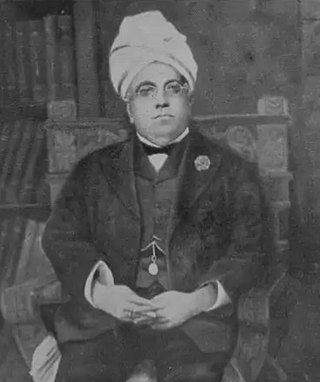
Vengayil Kunhiraman Nayanar was a Malayali essayist and short story writer, and a prominent landlord of Malabar district.
M. Krishnan Nair was an Indian academic, orator, literary journalist and literary critic of Malayalam literature. He was known for his Sahitya Varaphalam, a weekly column he wrote first in Malayalanadu weekly, later in Kalakaumudi and finally in Samakalika Malayalam Vaarika, which introduced world literature to Malayalam readers. He also published several books, including Saundaryathinte Sannidhanathil, Adhunika Malayala Kavitha and Vayanakkara, Ningal Jeevichirikkunno?. He was a recipient of the Kerala Sahitya Akademi Award for Overall Contributions and the B. D. Goenka Award for excellence in literary journalism.
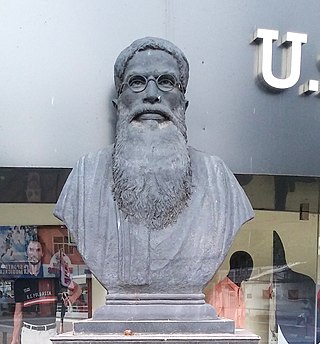
Akathoot Balakrishna Pillai (1889–1960), better known as Kesari Balakrishna Pillai, was a Malayalam writer, art and literary critic and journalist, considered by many as one of the most influential thinkers of modern Kerala. He was the eponymous founder of the newspaper, Kesari and was one of the three major figures in modern Malayalam literary criticism, along with Joseph Mundassery and M. P. Paul. Besides works such as Kesariyude Lokangal, Navalokam, Sankethika Nirupanangal Sahitya Nirupanangal, Rupamanjari, he also wrote a text in English under the title, Outlines of the Proto-Historic Chronology of Western Asia.
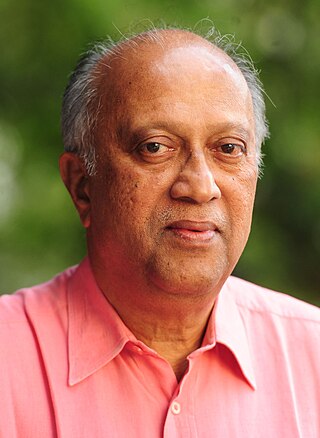
Thomas Jacob is an Indian former journalist who was the editorial director of Malayala Manorama.

Cannankara Velayudhan Raman Pillai, also known as C. V., was one of the major Indian novelists and playwrights and a pioneering playwright and novelist of Malayalam literature. He was known for his historical novels such as Marthandavarma, Dharmaraja and Ramaraja Bahadur; the last mentioned considered by many as one of the greatest novels written in Malayalam.
Karimpumannil Mathai George (1914–2002), popularly known as Dr. K. M. George, was an eminent Malayalam writer and educator. An erudite scholar and literary critic with astute organisational capabilities, he is best known as a pioneer of Comparative Indian Studies and Literatures. He was a recipient of the fourth highest Indian civilian honour, the Padma Shri, the highest literary award of the Government of Kerala, the Ezhuthachan Puraskaram and the third highest Indian civilian award, the Padma Bhushan, besides other honours.
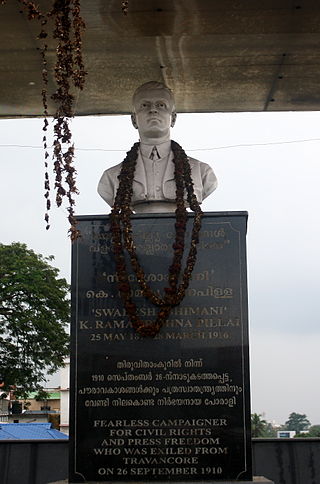
K. Ramakrishna Pillai (1878–1916) was an Indian nationalist writer, journalist, editor, and political activist. He edited Swadeshabhimani, the newspaper which became a potent weapon against the rule of the British and the erstwhile princely state of Travancore and a tool for social transformation. His criticism of the Diwan of Travancore, P. Rajagopalachari and the Maharajah led to the eventual confiscation of the newspaper. Ramakrishna Pillai was arrested and exiled from Travancore in 1910. Vrithantha Pathra Pravarthanam (1912) and Karl Marx (1912) are among his most noted works in Malayalam, Vrithantha Pathra pravarthanam being the first book on journalism in Malayalam and Karl Marx, the first ever biography of Karl Marx in any Indian language. But it has been alleged that he plagiarized the biography from an essay, Karl Marx:A Modern Rishi, by Lala Hardayal, published in 1912 March issue of the Modern Review, published from Kolkata.

Keezhoote Raman Balakrishna Pillai was an Indian politician who served as minister of the state of Kerala in India, holding portfolios such as Transport and Electricity. He was a member of the Kerala Legislative Assembly from Kottarakara constituency in Kollam district for almost three decades. He was the Chairman of Kerala Congress (B). Throughout his political career, Pillai remained a controversial figure in Kerala state politics. He was the first Kerala minister to be imprisoned for corruption.
Edappally Raghavan Pillai was an Indian poet of Malayalam literature and a close associate of Changampuzha Krishna Pillai. The pair, the front-runners of romanticism in Malayalam, was considered by many as the Shelley and Keats combination of Malayalam poetry. Kesari Balakrishna Pillai compared Pillai to the Italian poet, Giacomo Leopardi.

Kerala Varma, most commonly known as Mahakavi Pandalam Kerala Varma, was an Indian poet, scholar, and publisher. He was born in Pandalam, and belonged to the Pandalam Royal Family. He wrote two mahakavyas, more than a hundred narrative poems, translations, and children's poetry. He is widely regarded as the author of the first complete mahakavya in Malayalam. He was the owner and Chief Editor of Kavana Kaumudi, the first Malayalam periodical, which was also the first to introduce special issues in Malayalam.
Mathrubhumi Azhchappathippu is an Indian general interest weekly magazine published by the Mathrubhumi Printing and Publishing Company in Calicut. The Malayalam language magazine started publishing on 18 January 1932.

Freedom of the press in British India or freedom of the press in pre-independence India refers to the censorship on print media during the period of British rule by the British Crown on the Indian subcontinent from 1858 to 1947. The British Indian press was legally protected by the set of laws such as Vernacular Press Act, Censorship of Press Act, 1799, Metcalfe Act and Indian Press Act, 1910, while the media outlets were regulated by the Licensing Regulations, 1823, Licensing Act, 1857 and Registration Act, 1867. The British administrators in the India subcontinent brought a set of rules and regulations into effect designed to prevent circulating claimed inaccurate, media bias and disinformation across the subcontinent.

Kesari is a weekly Malayalam language magazine affiliated publication of the Hindu nationalist volunteer organisation Rashtriya Swayamsevak Sangh (RSS) and it is also known as the mouthpiece of the RSS Kerala.
Sharada, the second Malayalam women's magazines to be published in Kerala, was started in November 1904 from Thripunithura, Kochi. Sharada was edited by B. Kalyani Amma, T.C. Kalyani Amma and T. Ammukutty Amma. It was the first women's magazine to be edited by women in Kerala. K. Narayana Menon was the owner of the magazine and it was printed at Bharathi Vilasam Press.
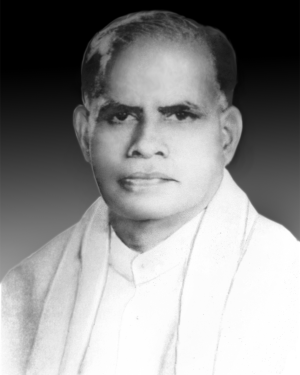
K. A. Damodara Menon (1906-1980) was an Indian National Congress politician, minister, journalist, writer, freedom fighter and an activist in the movement for united Kerala. He was elected to the Provincial Parliament in 1950 and Indian Parliament from Kozhikode as a representative of Kisan Mazdoor Praja Party, in 1952. During his term as a member of Kerala Legislative Assembly, he served as the Minister for Industries and Local Administration.
Prabhatham was a Malayalam-language weekly newspaper published from Shoranur in Malabar, British India. Founded in 1935 and edited by E. M. S. Namboodiripad, it was the organ of the Congress Socialist Party (CSP) in Malabar, Travancore and Cochin. The newspaper was subjected to censorship right from its inception. It had to close down due to the heavy security imposed on the paper for publishing a poem on Bhagat Singh's death. The newspaper resumed publication in April 1938. It shifted to Calicut and continued as a weekly until the outbreak of World War II in September 1939. Prabhatham was a short-lived newspaper both because of the colonial repression and because the CSP had lost its relevance after the formation of the Communist Party of India. The newspaper was instrumental in spreading socialist and communist ideologies in Kerala.












